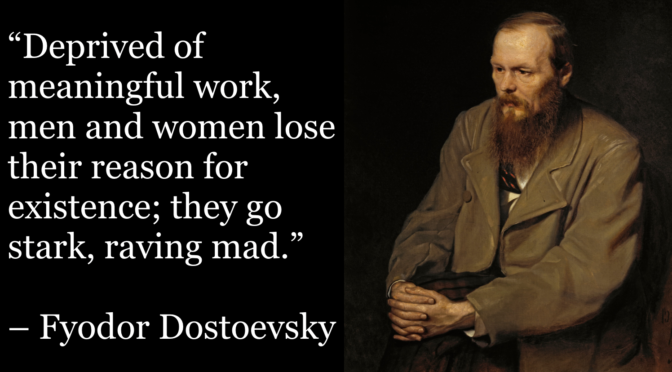In an opinion pice in the New York Times, professor Firmin DeBrabrander argues that you should not approach work as your passion but as your duty. Looking for passion at work, he says, will make you stressed and is bound to fail anyway.
I think that’s complete nonsense! I know – what a shocker :) But worst of all it’s poorly reasoned nonsense that relies on a string of terrible arguments and deliberate ignorance of the research in the field.
Here are the top 5 fails from DeBrarander’s article and why you should most definitely seek work you’re passionate about.
1: He blames the long US working hours on people’s passion for their jobs
The United States offers a curious paradox: Though the standard of living has risen, and creature comforts are more readily and easily available — and though technological innovations have made it easier to work efficiently — people work more, not less.
Why is this?
One theory is that Americans have come to expect work to be a source of meaning in their lives.
There are no studies showing that people who find work meaningful work more hours than those who don’t.
If you want to actually know why working hours are still on the rise in the US, I think it makes much more sense to look at some of these factors:
- Bad management practices
- Workplace cultural norms
- Economic insecurity caused by a hugely challenged middle class that are one pay check away from financial disaster.
- The high cost of college educations and the huge amount of debt that many young people graduate with – meaning that they absolutely must work or face personal bankruptcy.
Put people with huge financial insecurity in a workplace that expects and demands 60, 70 or 80-hour work weeks, and they most often have no option but to go along and work themselves to death.
2: Being passionate about your work means that you experience constant bliss
Most people are certainly guaranteed to fail in this pursuit [of passion at work]. Even people who love their jobs will report they must do thankless tasks from time to time. Few, if any, experience nonstop bliss, where sheer passion sustains them through long hours on the job.
Notice what DeBrabrander did there? He just redefined being passionate about your work to mean that you experience nonstop bliss and sheer sustained passion.
This is what’s known as a strawman argument, where you exaggerate, misrepresent, or just completely fabricate someone’s position, to make it easier to attack.
Just to be clear: Being passionate about your job does not mean that you experience nonstop bliss. Everyone has bad days at work – and that’s perfectly OK. And of course every job contains a mix of tasks that you enjoy and tasks that suck – and that’s OK too.
3: Young people burn out because they seek passion at work
There is plenty of evidence that our high-octane work culture has serious consequences. It is at least partly responsible for high levels of burnout among millennials.
This is an especially bad argument because studies show that people who find meaning at work experience less stress and burnout.
And while there definitely is an increase of stress, burnout, depression and mental problems among young people, it’s intellectually lazy to just conclude that it’s caused mainly – or even partly – by their search for passion and meaning at work.
Young people are also facing many other pressures, including a global climate disaster that no one is doing much about, while they are of course the ones who will have to live with the consequences of that inaction. Might that be a source of stress for them? No, says DeBrabrande – their real problem is that they expect their jobs to be meaningful.
4: If you seek passion in your work, you will fail
A recent study of priorities among young people found that achieving one’s career passion ranks highest of all… Finding a fulfilling job is almost three times more important than having a family, teenagers in the study reported.
It is daunting to contemplate. Most people are certainly guaranteed to fail in this pursuit.
Got that? If you seek passion at work, you are almost guaranteed to fail. Really? How would he know? Of course, he’s previously redefined passion at work to mean constant bliss and if that’s your goal, of course you will fail.
And just to make it worse, the study he links to in support of his claim is not even about passion at work. The actual finding is that 95% of US teenagers surveyed say that “having a job or career they enjoy” is important to them.
5: Passion means that work is the ONLY source of meaning in your life
We might begin by rejecting the notion that work should consume our lives, define and give meaning to them…
Again, the article dishonestly redefines passion to mean that work consumes your life and gives meaning to it.
In reality, passion for your job simply means that you are passionate about the work you do – not that it’s the only thing are passionate about.
In fact, studies show that people who are passionate about their work are happier and more active outside of work as well.
Why you absolutely should seek work you’re passionate about
This kind of attack on happiness at work is nothing new. Many serious people are coming out of the woodwork to declare that happiness at work is stupid, impossible, naïve, silly, manipulative and/or bad for you. In the video above we cover their 20 most used objections to workplace happiness and why they’re wrong.
DeBrabrander’s analysis is poorly argued and of course also wrong. Everyone should absolutely seek work they’re passionate about. There are many reasons why, but the most important are these:
- It will make you happier at work
- It will make you happier in life
- It will make you more successful at work
- It will protect you from doing harmful work – whereas not trying to find meaning at work makes it more likely that you will end up doing work that exploits or harms others
- Work is where you will spend many of your waking hours – of course you should spend that time doing something you care about
- Work is where you will invest most of your energy, skills and competencies – all of that effort should be invested in the service of a cause you care about
Paradoxically, I actually think DeBrabrander agrees! When he talks about approaching work as duty rather than passion, he bases this on an understanding of duty that comes from stoic philosophy. I have many, many issues with stoic philosophy – not least that it is based on the idea that we are all subjects to a predetermined fate – but it has recently become very fashionable, especially among silicon valley tech bros.
In the NYTimes pice, DrBrabrander recounts The advice of Seneca, one of the most prominent stoics to define duty like this:
Seneca’s advice to Serenus is to focus on doing his duty. He must perform the job he is best disposed and able to perform, as determined by his nature, and the needs of those around him. And he must forget about glory or thrill or personal fulfillment — at least in the near term. If he performs his duty, Seneca explains, fulfillment will come as a matter of course.
Duty, in this definition, is not just about having a “Shut up and do your job” approach. It’s about doing work that you’re good at and which meets the needs of those around you.
BUT THAT’S EXACTLY WHAT MEANINGFUL WORK IS!
If DeBrabrander had been the tiniest bit curious about the research in this field, he would have found that this is precisely how Amy Wrezniewski and others define the “calling” approach to work:
In the “calling” orientation, people are working not for career advancement or for financial gain, but instead for the fulfilment or the meaning that the work itself brings to the individual. People who see their work more as a calling see the work as an end in itself that is deeply fulfilling and regardless of the kind of work they’re doing, they tend to see the work as having a societal benefit.
It’s ultimately about working for something bigger than yourself.
The upshot
This opinion piece is poorly researched and dishonest – so of course the advice it gives is bad.
Seeking passion and meaning at work is the path to more career happiness and success and less stress and burnout. It’s also one way you can help create a better world, by making sure that all of your professional skill and energy is spent in the service of something that you can clearly see is making the world a better place, rather than in just obtaining a pay check or career advancement.
I have to say, if you make your career choices with no consideration for where your passions lie, I honestly pity you.
Related posts
- Jobs, careers and callings – why having work you care about makes you happier and more successful
- 5 reasons why you can’t motivate employees with money
- Terrible advice from Mark Cuban: Ignore your passion and just work hard
- The best and clearest company purpose I’ve ever seen
- The meaning of life is happiness… just not your own


 Discussing public policy in Dubai
Discussing public policy in Dubai


 I was asked by Paul Thornton to contribute to a booklet he’s writing called How to Succeed in Today’s Business World. Paul wanted to know the best piece of business advice I’ve ever received.
I was asked by Paul Thornton to contribute to a booklet he’s writing called How to Succeed in Today’s Business World. Paul wanted to know the best piece of business advice I’ve ever received. You can know the name of a bird in all the languages of the world, but when you’re finished, you’ll know absolutely nothing whatever about the bird… So let’s look at the bird and see what it’s doing — that’s what counts. I learned very early the difference between knowing the name of something and knowing something.
You can know the name of a bird in all the languages of the world, but when you’re finished, you’ll know absolutely nothing whatever about the bird… So let’s look at the bird and see what it’s doing — that’s what counts. I learned very early the difference between knowing the name of something and knowing something.